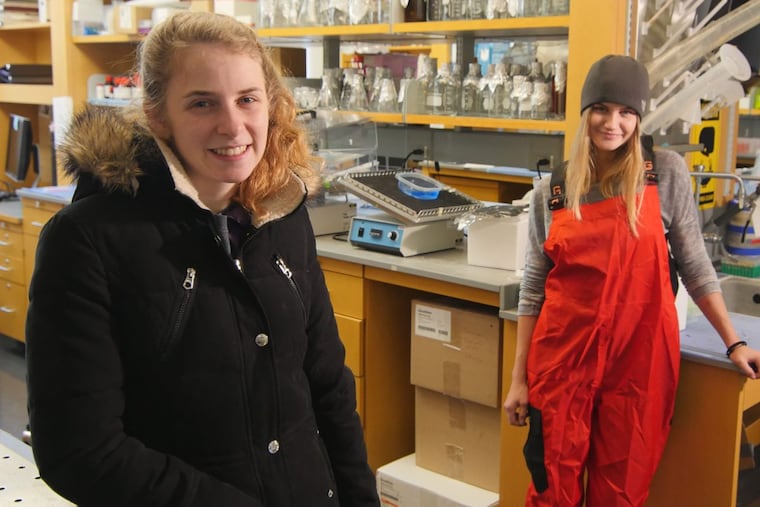Antarctica checklist: Gummies, Reese's cups, and EKGs as Rutgers students ready for epic journey
Rutgers University students embarking on Antarctica trip to study climate change

Three Rutgers University seniors jumped at the chance to travel to opposite ends of Antarctica this month to help researchers gather data on the effects of climate change.
But to land the coveted spots offered by the School of Environmental and Biological Sciences, the trio first had to pass a grueling physical examination that included blood tests, shots, an EKG, and a trip to the dentist to fix any cavities and remove their wisdom teeth, if needed. At sea for weeks, with limited medical care available, they cannot afford to risk a health scare.
The three South Jersey natives, Taylor Dodge, Rachael Young, and Steven Weber, are heading to the Antarctic for a trip of a lifetime. Young, 21, of Ocean City, left Tuesday for Terra Nova Bay in the western Ross Sea, where she will spend three months at sea. The others depart Dec. 27 for the West Antarctic Peninsula.
"I'm so excited I can't even explain it," Young said Monday. "It's been one of my biggest goals."
Young and Dodge, roommates, and Weber met freshman year in an oceanography class at the New Brunswick campus. A documentary about work by their professor, Oscar Schofield, a renowned oceanographer who has studied rapid change in the Antarctic, inspired the students to apply for the research project.
Schofield, who is traveling this week to Palmer Station, an American research station on the West Antarctic Peninsula, said he has tried to show students "the fun of doing real research.
Schofield and his team are studying the impact of climate change on wildlife species along the peninsula, where temperatures have risen by 11 degrees Fahrenheit, making it the fastest-warming spot on the continent.
"I think it is critical for students to see early on that doing science, especially field science, is an adventure as well as being an extremely creative endeavor," Schofield wrote in an email.
Young said she views climate change as a significant threat facing the world and believes research such as Schofield's could help save the environment. "If we don't do climate change research now, we won't know how to make our future better."
It took several tries for the students to get selected for the Antarctica project. Dodge and Young will miss the last semester of their senior year and will graduate in the fall. Weber, 21, of Mount Laurel, was asked only a few weeks ago to join the team to fill a last-minute vacancy and had to scramble to complete his physical, which he easily passed. The others began undergoing their physicals last summer.
Because of the remote location and time that they will be away, the students must be in tip-top shape. Dodge, 22, of Pilesgrove in Salem County, needed a root canal operation and several trips to the dentist. Wisdom teeth are removed to avoid any chance of an infection while at sea.
They also must pack carefully enough crucial supplies and toiletries for up to three months. Each can bring two suitcases, up to 50 pounds each.
"There's not like a grocery store you can go to," Young said. "I want to make sure I have everything."
Young planned to pack her favorite chocolate bars, and for Dodge, Reese's peanut butter cups and Gummi candy for a graduate student already in the Antarctic who asked her to bring a sweet treat. Weber didn't have a "must have" item to take along.
"I'll pretty much eat whatever they put in front of me," Weber said Tuesday.
A volunteer firefighter and member of the Coast Guard, Weber said he believes he will have little difficulty withstanding the frigid temperatures. He has done cold weather camping in 14-degree conditions, he said. "I managed to survive that."
The biggest challenge for Dodge may be overcoming a tendency to seasickness. Despite that, she plans to join the Navy after graduation.
"I'm going to pack lots of Dramamine. I'm going to try everything I can," Dodge said with a laugh. She has visited three continents and hopes to eventually visit all seven.
Dodge and Weber are to spend six weeks on a ship traveling down the West Antarctic Peninsula, making stops along the way. They will be collecting krill, tiny crustaceans for the Long Term Ecological Research Project, which started in 1990. Weber then will return home and complete his last semester at Rutgers and possibly enter the Coast Guard Academy. Dodge will spend six weeks at Palmer Station with Schofield and his team.
"I'm excited to be in the field and see the research from start to finish," said Dodge, who wants to write conservation and sustainability policy after graduation.
Young, who will spend her time near the International Date Line, will gather data on krill, a species that serves as food for many fishes and birds. She will also help deploy a submersible robot glider to determine the abundance and location of krill in the water column.
The experience to explore her passion for research and science, says Young, is worth the sacrifice. She will miss Christmas with her family, celebrating her birthday in February, and graduating with her class.
"My goal is to learn as much as possible in the three months. It's one of those opportunities that comes once in your life," she said.